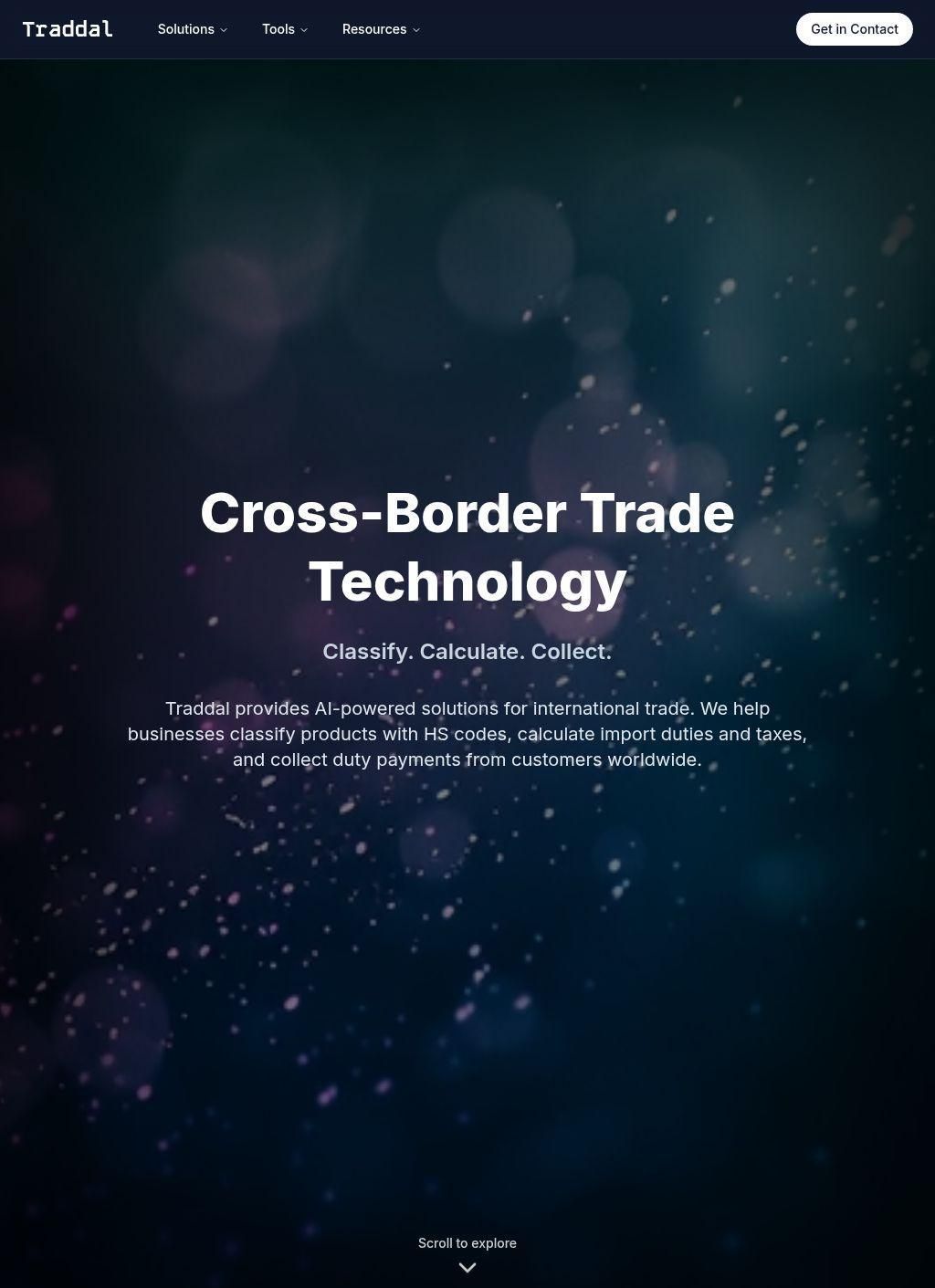Traddal operates as a cross-border trade technology platform focused on three core functions: product classification, duty calculation, and payment collection for international commerce. The service targets businesses engaged in global trade, providing tools to navigate customs regulations, tariff schedules, and import taxation across different countries.
The classification service uses artificial intelligence to assign HS codes to products. HS codes, or Harmonized System codes, represent standardized international product classification numbers required for customs clearance worldwide. The AI system analyzes product descriptions written in multiple languages and suggests appropriate codes with confidence scores indicating accuracy likelihood. The technology employs natural language processing to interpret product attributes and match them to tariff classification schedules.
Classification capability extends to various international tariff systems. US HTS (Harmonized Tariff Schedule), UK tariff schedules, and global HS nomenclature all fall within the platform's scope. Users can classify individual products manually or process thousands of items simultaneously through bulk import features and API integration. The API allows automated classification for businesses with large product catalogs requiring ongoing code assignment.
The duty calculation function computes customs costs for international shipments. Once products receive HS code classification, the calculator determines import duties, value-added tax, goods and services tax, and other customs fees based on the destination country, product value, and applicable trade agreements. The system maintains a global tariff database covering over 200 countries, providing real-time landed cost estimates that factor in all import-related expenses.
Trade agreements get factored into duty calculations. Preferential tariff rates available through free trade agreements or regional trading blocs can significantly reduce import costs compared to standard most-favored-nation rates. The platform accounts for these variations when computing duties, ensuring calculations reflect actual costs rather than generic baseline rates.
Payment collection functionality integrates with Stripe to handle financial transactions. Businesses can collect customs duties, import taxes, and shipping fees from customers at checkout or through generated payment links. This collection happens before goods ship, enabling Delivered Duty Paid arrangements where sellers cover all import costs upfront. Customers receive transparent pricing without unexpected customs bills upon delivery.
The DDP delivery model addresses a common friction point in international e-commerce. When duties get collected at the border by customs authorities, recipients often face surprise charges, payment delays, and sometimes abandoned shipments. Pre-collecting these costs eliminates that uncertainty, improving customer satisfaction and reducing delivery complications for sellers.
Payment requests can be branded and customized for each transaction. The Stripe integration ensures PCI-compliant payment processing with secure handling of financial data. Funds collected represent customs duties and taxes that sellers then remit to appropriate authorities upon import, rather than revenue from product sales.
Target users span several categories within international trade. E-commerce businesses selling cross-border use the platform to classify inventory, display accurate duty costs at checkout, and collect import charges before shipping. Integration options exist for Shopify, WooCommerce, and other e-commerce platforms, allowing automated classification and duty calculation during the shopping experience.
Freight forwarders represent another user segment. These logistics companies use the classification and calculation tools to provide clients with accurate landed cost estimates before shipments move. Understanding total import costs upfront allows better pricing decisions and reduces financial surprises during customs clearance.
Customs brokers leverage the AI classifier to accelerate product classification processes. Speed matters in customs brokerage where delays cost money and create bottlenecks. Automated classification suggestions reduce the time brokers spend researching tariff schedules and determining appropriate codes for diverse products.
Import and export companies managing cross-border shipments use Traddal for duty cost calculations, compliance documentation management, and payment collection from international buyers. Trading companies dealing with multiple product types across various countries face complex classification and duty calculation requirements that the platform aims to simplify.
The platform emphasizes compliance and accuracy. Using correct HS codes and duty calculations helps businesses stay compliant with customs regulations in different jurisdictions. Misclassification can result in fines, shipment delays, or rejected entries at customs. The AI system's confidence scores help users assess classification reliability before submitting declarations.
Processing speed gets highlighted as a platform advantage. AI-powered classification delivers results within seconds compared to manual tariff schedule research that can take considerably longer. Bulk processing capabilities allow handling thousands of products quickly, essential for businesses with large catalogs needing systematic classification.
Global coverage distinguishes the service from region-specific solutions. Supporting tariff schedules and trade agreements for over 200 countries positions Traddal as a worldwide tool rather than one limited to specific trade corridors. Businesses selling to multiple international markets can use a single platform for classification and duty calculation across all destinations.
